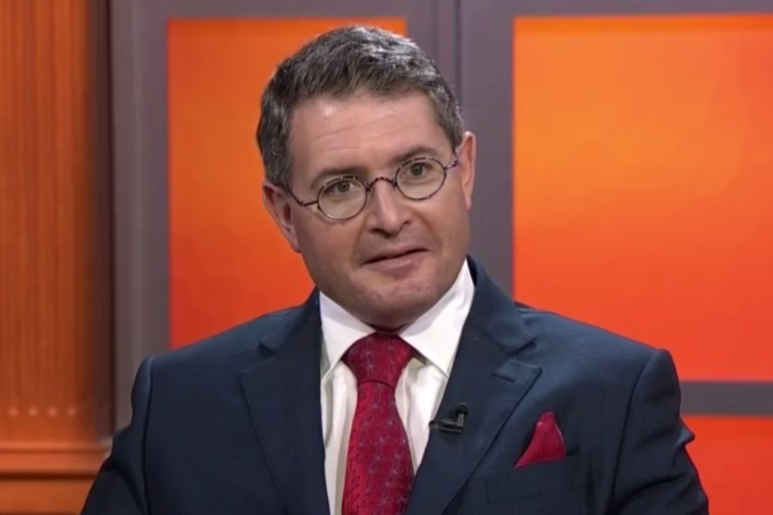Florida's judicial pipeline filled by right-wing Federalist Society

Leonard Leo, executive vice president of the Federalist Society, screens and recommends judicial nominees for both the president and Florida Gov. Ron DeSantis. (Image is from C-SPAN.)
First-term Florida Gov. Ron DeSantis will probably get a fourth and fifth appointment to the seven-member state Supreme Court by early next year. The Republican governor made three appointments in January during his first few days in office, but President Donald Trump recently nominated two of those justices, Barbara Lagoa and Robert Luck, to a federal appeals court.
Before DeSantis appointed Lagoa and Luck, Leonard Leo, executive vice president of the conservative Federalist Society, flew from Washington, D.C., to Florida to interview them, and their eventual appointments were celebrated at the Federalist Society's state chapter. Leo also advises Trump on judicial nominations and led campaigns to support justices Neil Gorsuch and Brett Kavanaugh.
Though the Federalist Society doesn't disclose all of its donors, it has acknowledged support from the Koch brothers, Walmart, and the U.S. Chamber of Commerce, which also funds groups that run ads supporting corporate-friendly judicial candidates. In addition, Leo is closely tied to a Virginia-based secret-money outfit called the BH Group that made an anonymous $1 million donation to Trump's inauguration.
In Florida, the governor selects judges from lists compiled by nominating committees that choose those they consider the most qualified applicants. The governor in turn picks most members of the nominating committees.
But DeSantis has pressed for more control over who ends up on the list of qualified applicants — for example, demanding that one local nominating committee include a prosecutor on its list. The commission's Republican chair resigned over the order, saying, "It has always been left to the Committee's sole discretion as to who was qualified and who was not."
DeSantis' three appointments in January shifted the court from a 4-3 liberal majority to a 6-1 conservative one. That transformation has already had real-world consequences. For example, Lagoa and Luck joined in a February decision that made it harder for homeowners to hold banks accountable for improperly foreclosing on homes. The court will soon decide whether several constitutional amendments — including a $15 minimum wage — can go on the ballot next year.
DeSantis also recently filled two seats on Florida's 1st District Court of Appeal, which hears constitutional challenges to state laws, with Federalist Society members. With DeSantis' appointees, the 15-judge court is two-thirds male and has just one black judge. The Florida Phoenix reported that the nine lawyers who applied for the seats are white, while six are Federalist Society members, and four are millionaires.
This month, two Democratic legislators introduced a bill that would restore the original structure of the nominating committees and give the governor three appointments out of nine, rather than a majority. Another three members would be chosen by the state bar association, and those six members would choose the remaining three members by a majority vote. No more than five members could belong to the same political party.
State Sen. Perry Thurston, a Democrat and member of the Black Caucus, described the bill as an effort to ensure the committees are impartial and independent. "Floridians expect better than a governor's whim when it comes to appointing the men and women who have the power to interpret laws," he said.
The bill would also require the governor to consider "diversity in terms of race, ethnicity, disability, veteran status, gender, gender identity and sexual orientation" when making appointments to nominating committees.
Like Trump, DeSantis and his predecessor have faced sharp criticism for failing to appoint black judges. Trump's judges have been 86 percent white, while DeSantis has appointed just four black judges to the lower courts out of 32 total. DeSantis' predecessor, now-U.S. Sen. Scott, served two terms and didn't appoint a black appellate judge until his final days in office. Texas Gov. Greg Abbott (R) is facing similar calls to restore racial diversity to his state's high court when he fills a current vacancy.
DeSantis' nominations have left the Florida Supreme Court less racially diverse than it has been in decades. The nominating committee's list of potential justices didn't include any black applicants, and DeSantis declined to ask for more names. An attorney for the Miami-Dade NAACP said Scott had packed the committee with people who were "more interested in evaluating whether a potential justice is in alignment with the governor's priorities rather than reflective of the diversity of our state."
Activists are pressing DeSantis to appoint a black justice to fill one of the upcoming vacancies on the high court. Democratic State Sen. Bruce Anton, the Black Caucus chair, said they were urging the governor to "make diversity a priority." Since DeSantis' predecessor left the state with fewer black candidates with judicial experience, Anton said that his colleagues and the black community must "begin finding qualified candidates and get them ready."
Tags
Billy Corriher
Billy is a contributing writer with Facing South who specializes in judicial selection, voting rights, and the courts in North Carolina.
